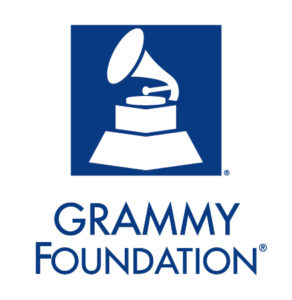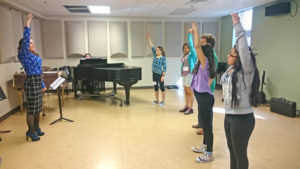Aided by an award from the GRAMMY Foundation® Grant Program, two School of Music, Theatre and Dance professors at Colorado State University are set to lead a study on musical creativity in children with autism spectrum disorder. 
With a $19,697 GRAMMY Grant, combined with an additional $20,132 from CSU, Erik Johnson, assistant professor of Music Education, and Blythe LaGasse, associate professor and coordinator of Music Therapy, are positioned to launch their project, “Musical Creativity in Autism: Exploring Growth through Collaborative Peer Interaction.”
Funded by the Recording Academy, the pair’s project was one of 20 in the United States and Canada to receive awards totaling $300,000 from the GRAMMY Foundation with the purpose of facilitating research in music, as well as recording archiving and preservation programs. Just six organizations – primarily universities and hospitals – were research-oriented recipients.
“We are proud to be a leading funder in these areas of philanthropy and lend our resources to such distinguished recipients and exemplary endeavors,” Neil Portnow, president/CEO of The Recording Academy® and the GRAMMY Foundation said in a press release.
Defining the project
It is a core understanding that a lack of social communication skills, as well as restrictive and repetitive patterns, not only impedes the ability of a child with autism to make meaningful connections with peers, but inhibits cognitive flexibility and creativity.
Encouraging research indicates that children with Autism Spectrum Disorder (ASD) do have typical processing of emotion in music, as well as heightened musical skills. However, until this study, peer-assisted learning research in music, where students are strategically paired to enhance the educational outcomes of both, has been primarily focused on children without disabilities.
The CSU study seeks to examine the impact of peer-assisted learning on musical and social outcomes in children with ASD.
An intersection of interests
A prominent ASD researcher in Music Therapy, LaGasse’s penchant for working with children, while increasing opportunities for social and collaborative learning, was of extreme interest to Johnson.
“Working at CSU has opened up many opportunities for me to discover other faculty’s work, including the work of Dr. Blythe LaGasse,” said Johnson. “Early on in my time here at CSU, we had a conversation where we ‘dreamed big’ about how peer-assisted learning could help students with ASD.”
Anticipating a successful conclusion, the findings will be disseminated to music educators and therapists who may utilize peer-to-peer musical experiences to engage children with ASD. Johnson and LaGasse hope that as a mode of instruction, peer-assisted learning will also help public school educators further the music learning for all students.
 The opportunity for research collaboration between the areas of music therapy and music education is important to the mission of the School of Music, Theatre and Dance.
The opportunity for research collaboration between the areas of music therapy and music education is important to the mission of the School of Music, Theatre and Dance.
“When I learned of Dr. Johnson’s expertise and research in peer-assisted learning, I was very excited about the possibility of bringing our two interests together in order to help educators and children,” LaGasse said.
The two CSU researchers plan on publishing the results in a peer-reviewed open-access journal, as well as present at national and international conferences relevant to ASD research and intervention.
“We hope that what is learned may enrich the lives and educational opportunities available to children with ASD,” said LaGasse.
For the study, it is important to LaGasse and Johnson that the 30 high-functioning children with ASD and 30 typical children be recruited from a wide array of geographical backgrounds beyond Northern Colorado. Johnson hopes that the notoriety of the GRAMMY award helps cast a wider net for nominations.
“Receiving this award is a huge honor, both for Dr. LaGasse and myself, as well as for CSU,” said Johnson. “This is a once-in-a-lifetime opportunity!”
About the GRAMMY Foundation
According to the organization’s website, the GRAMMY Foundation was established in 1988 to cultivate the understanding, appreciation and advancement of the contribution of recorded music to American culture — from the artistic and technical legends of the past to the still unimagined musical breakthroughs of future generations of music professionals.
The foundation accomplishes this mission through programs and activities that engage the music industry and cultural community as well as the general public. The foundation works in partnership year-round with The Recording Academy to bring national attention to important issues such as the value and impact of music and arts education and the urgency of preserving our rich cultural heritage.
To learn more about the GRAMMY Foundation and its grant program, visit grammyfoundation.org/grants.
About the researchers
Erik Johnson is assistant professor of Music Education at Colorado State University. Johnson’s work has included descriptive and experimental PAL studies. His recent work has expanded the PAL paradigm in music education by examining multifaceted outcomes related to various reciprocal PAL structures. This emerging constellation of studies suggest that PAL can improve individual achievement, motivation and learner engagement for a diverse range of secondary public school music students. Johnson will oversee the project design, timeline and manuscript/conference preparation. Contact Johnson at e.johnson@colostate.edu.
Blythe LaGasse is associate professor and coordinator of Music Therapy at Colorado State University and faculty at the Center for Biomedical Research in Music. LaGasse trained music therapists in Neurologic Music Therapy for eight years. She has more than 13 years’ experience working with children with ASD. She has published over 10 refereed papers on the application of NMT with children with disabilities. Her research with children with ASD has received support from the American Music Therapy Association. LaGasse will assist in study implementation and manuscript preparation. Contact LaGasse at blythe.lagasse@colostate.edu.